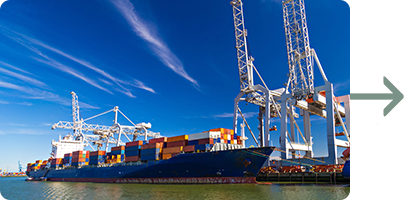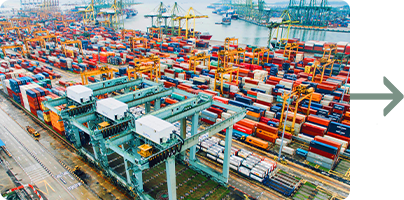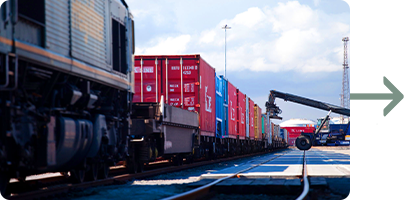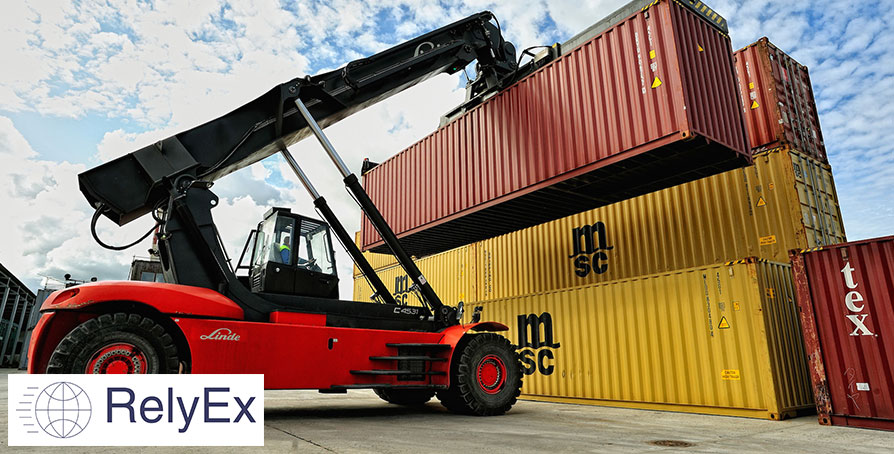Unique Logistics Solutions to Complex Container Drayage Issues
Today, more than 80% of global shipping involves containers. They're packed with everything from personal storage items in dry containers to heavy machinery on flat rack containers. For business owners shipping products, getting a container from point A to point B requires precise planning and high-level tracking. But that's easier said than done when global supply chains become over-congested, leading to loading time issues and delays.
That's bad news for business owners who are already under a massive amount of stress. The truth is that container storage delays can cripple a business, but there's a viable solution: drayage brokers in Kansas City, MO like RelyEx. Drayage companies provide unique solutions to minimize demurrage and help ensure the successful delivery of your freight.
With more than 30 combined years of experience and a solutions-oriented team, RelyEx has quickly become the first choice for streamlined, efficient drayage services. To understand the true value of RelyEx's offerings in the global logistics industry, it helps to understand first what drayage is and why it's used.
What is Drayage and Why Is It Important?
If you're a seasoned business owner who uses port drayage to transport your products, you know exactly how important the service can be. But if you were to poll a group of random people, you may get five different definitions of the term "drayage." That begs the question, how is one of the most crucial steps in the supply chain and most vital components of global trade such a confusing concept? When you break it down, it's not too difficult to grasp.
Drayage, by definition, means the transportation of freight from an ocean port to another destination. Today, drayage is also used to describe the process of transporting products and goods over short distances or over "the first mile."
While drayage often means short-distance movements during the supply chain process, it's primarily used in the container shipping space. Drayage loads usually have arrival and departure points in the same city and don't include long-haul, national transportation.
Let us know how we can help.
drayage broker Services
Service Areas
Because a drayage load can mean a few different things, confusion among carriers is common. Many carriers link drayage with going into a port, but that isn't always true. While all drayage loads typically originate from a port of entry, there are often several legs of a drayage journey before a container turns up at its final stop. Legs of a drayage load may include:
Why Are Drayage Companies in Kansas City, MO So Important?
You may be thinking, what's so important about drayage? It's such a small step in the container storage transport process. In reality, it's an integral piece needed in the logistics industry and a crucial part of U.S. supply chain management.
To truly understand the importance of drayage, let's use flowers as an example. Most cut flower shipments enter the market from areas in South America until they end up at Dutch auction houses. Once there, wholesalers purchase flowers in bulk and send those products to retail outlets worldwide. Because flowers are perishable, they typically need to be refrigerated and are often shipped in reefer containers. These refrigerated vessels must maintain a certain temp to prevent loss.
Drayage companies like RelyEx allow flower shippers to send their products from Argentinian ports to airports in the Netherlands with peace of mind because their products are protected. The only way to accomplish this feat is with the help of swift, meticulous port drayage services. Drayage companies allow flower shippers to send their products from Argentinian ports to airports in the Netherlands with peace of mind, because their products are protected. The only way to accomplish this feat is with the help of swift, meticulous port drayage services.
If port drayage is compromised, it can cause delays and even fines. You know the packages you get delivered to your front door from apps like Amazon? Without drayage and drayage brokers, one or two-day shipping times wouldn't even be possible.
As a multi-billion-dollar industry in the U.S. alone, it seems like drayage shipping issues shouldn't exist. But the fact is inefficiencies and congestion are still major problems at ports. Whether it's a lack of carriers, absent chassis, or overburdened terminals, delays lead to missed deadlines, lost revenue, and worse.
But anytime challenges exist, so too do innovative solutions.
QUOTE REQUEST
Port

Yard

Warehouse

Rail

The RelyEx Difference
RelyEx was created because our founders saw a need in the logistics space for more reliability and efficiency. The reality of the shipping and logistics industry is that it has become very transactional. It's an odd evolution, because most businesses seek a third-party logistics partner that is accessible, transparent, and committed to providing solutions.
As the logistics space continues to grow, it creates newfound expenses and complexities. Clients like ours know that and need a supply chain partner who is genuinely interested in their business. By understanding the needs of our customers and carriers, we can provide the most reliable, effective drayage services possible.
Unlike some drayage companies in Kansas City, MO, we begin managing your containers before they ever hit the ports by mapping out the most efficient pathways of delivery. That way, our team can discover the best drayage pathways to expedite delivery time and reduce fees that cut into profits.
Our valued drayage customers choose RelyEx because:

RelyEx Solves Problems
At RelyEx, we like to consider ourselves problem solvers. The nature of the container drayage industry presents new challenges every day, but we're firm believers that there's a solution to every hurdle we encounter. And while some drayage businesses implement a reactive approach, RelyEx customers choose us for our proactive mindset. We take pride in solving your company's drayage challenges to help you avoid frustrating fees, missed expectations, and delayed shipments. We strive to make every transaction successful and streamlined by partnering with shippers who prioritize transparent, prompt, and accurate communication.

RelyEx Has a Unique Vantage Point
RelyEx approaches your business from the customer's perspective - a unique approach that helps us provide high-quality, effective drayage services. We've been in the customers' shoes, know their pain points, and because of that, provide first-hand solutions to stressful supply chain issues. With over 30 years of collective knowledge, our team excels in:
- Inventory Management
- Logistics
- Purchasing
- Finance
Our varied, high-level drayage shipping experience helps us achieve our overarching goal: expertly managing your freight movement needs. That way, you can direct your time and focus on growing the core aspects of your business while we handle the heavy lifting. Throw in proactive planning to avoid bottleneck situations and strong communication for transparent customer relations, and you can see why so many companies trust RelyEx.

RelyEx Nurtures Strong Carrier Relationships
When it comes to shipping logistics, it only takes one mistake by a mediocre worker to disrupt your business. That's why, at RelyEx, we pride ourselves on forming and nurturing relationships with carriers who match our standards of care. Our founding partner started his career transporting freight for companies as an on-demand carrier. He uses that knowledge to maximize the resources of our carriers so that our customer's expectations aren't just met - they're exceeded.
Why Choose RelyEx as Your
Drayage Company in Kansas City, MO?
Based in the port city of Kansas City, RelyEx has a keen understanding of the challenges of managing the inbound and outbound flow of containers. Our team of container drayage experts provides your business with unique solutions to nuanced shipping problems, minimizing demurrage and ensuring the successful delivery of your freight.

Customers choose RelyEx because:
- We are a reliable drayage logistics partner that manages your freight from beginning to end
- We have a rare industry vantage point with 30+ years of client-side experience
- We foster and fortify the strongest vendor relations
- We take a proactive approach to problem-solving, not a reactive approach
Let us know how we can help.
 843-885-3082
843-885-3082

Your Drayage Shipments Managed from Start to Finish
Some drayage brokers don't care how customers feel about their service as long as they sign a contract and get paid. As a solutions-oriented team, RelyEx takes the opposite approach. We're motivated by the opportunity to overachieve for our customers and to provide them with the best logistics experience possible. With professional experience as carriers and shippers ourselves, we know the roadblocks and challenges you're facing. We excel at mapping out the best plans of action to solve those problems. But that's just the start.
Our tracking experts monitor and manage every aspect of your drayage shipment from booking to delivery, 24/7. Once booked, we look for the availability of your containers hourly once they're at port. When they arrive, our team acts quickly to access your storage containers when they're available.
Plus, RelyEx ensures your company's requirements are met by the carrier during loading and delivery and provide necessary documentation as fast as possible. With real-time tracking updates and access to our customer service professionals, your team has complete visibility throughout the shipping process.
We Source Top-Notch Operators at the Best Prices
Over the years, RelyEx has built a strong network of drayage carriers, transloading locations, and container storage spaces to provide you with the best possible options to match your drayage service needs. We know that searching for quality service presents an added layer of complexity and stress to our customers. That's why we work hard to take that off your plate by connecting you with our reliable shipping partners.
With a background moving freight as an on-demand carrier, our founding partner understands how to maximize the resources and equipment of our carriers to match your needs.


We Make Transparent, Timely Communication a Priority
Like other industries, the global logistics space is complex. Mistakes will be made, and problems will happen. With those truths in mind, RelyEx has built its reputation as problem solvers. Unlike other drayage companies, we don't shy away from this industry's complexities because we take pride in solving problems. Even better, we aim to do what's needed to avoid those problems altogether.
As your logistics partner, we will provide your company with accurate, transparent, and prompt communication. If there are unexpected issues, we'll notify you immediately and will provide several options to remedy the problem. We even offer custom reporting for large clients who need at-the-moment updates and quick access to shipment documentation.
We Have Robust Project Management Experience
Why let the unpredictability of your industry dictate your success? With a background working in manufacturing, our founders are familiar with the demands of managing production schedules and sales orders. That experience makes it abundantly clear to us that every business and industry is different. If you struggle with seasonal surges or other factors, our team supports your business with a mapped-out plan and schedule, so you stay ahead of the game.
QUOTE REQUEST
How to Avoid
Demurrage Fees for Your Business
Based in the port city of Kansas City, RelyEx has a keen understanding of the challenges of managing the inbound and outbound flow of containers. Our team of container drayage experts provides your business with unique solutions to nuanced shipping problems, minimizing demurrage and ensuring the successful delivery of your freight.
What is shipping demurrage?
Demurrage is a charge issued by a port, carrier, or railroad company for storing containers that do not load and unload their cargo promptly. Once the daily limit of free time is exceeded, shippers are charged daily demurrage fees until their cargo is shipped. Though different ports have different policies, charges can range from $75 to $150 per container, per day, for a set number of days. Additional demurrage fees are incurred if a shipper exceeds the port's parameters.

What causes demurrage charges?
Even when shippers maintain a tight schedule for unloading freight, external factors can play an uncontrollable part. Typically, shipping mistakes caused by human error trigger the most demurrage charges. Some of the most common causes of demurrage include:
- Paperwork Errors
- Payment Delays
- Documents Received Too Late

Paperwork Errors
Typically, shippers need four specific documents to clear shipments through customs: A Bill of Lading (or BOL), a commercial invoice, a packing list, and an arrival notice. Seasoned drayage brokers like RelyEx are used to preparing these documents, but new shippers tend to miss this step due to inexperience.
Payment Delays
If a shipper only pays for part of their shipment, a vessel operator may refuse to release their freight until their bill is fully paid. Payment delays lead to cargo detention at the port of entry, which triggers demurrage charges.
QUOTE REQUESTDocuments Received Too Late
Paperwork is needed when you're shipping goods with a drayage company. When documents like the Certificate of Origin or Bill of Lading arrive at their destination late, you can expect demurrage fees. RelyEx avoids this situation entirely by being proactive when submitting paperwork.
Additional causes for demurrage fees can include:
- Damaged Container Storage
- Custom Released Containers
- Storage Containers Are Too Heavy
Free Consultation
RelyEx:
The Supply Chain Partner You Can Count On
At RelyEx, we know first-hand how stressful supply chain problems can be for business owners. Though drayage shipping might seem minor on the surface, it affects every stage of your shipping process. And when inevitable hurdles manifest, RelyEx propels you over the proverbial roadblocks with a proactive mindset and a passion for challenging projects. We believe that all problems have a solution, and our unique vantage point allows us to provide first-hand solutions to customers in a wide array of industries.
When it comes to your business, don't settle for anything less than RelyEx. Contact our office today to learn more about how we make your shipping experience streamlined and stress-free.
 843-885-3082
843-885-3082
Latest News in Kansas City, MO
Travis Kelce wasn't going to hold out, 'grateful' to Chiefs for deal
Adam Teicherhttps://www.espn.com/nfl/story/_/id/40063407/travis-kelce-going-hold-grateful-chiefs-deal
ReactionsLike779Interesting6Laugh5Wow2Celebrate2Fire1KANSAS CITY, Mo. -- Travis Kelce informed the Kansas City Chiefs he wanted a pa...
Reactions
Like
779
Interesting
6
Laugh
5
Wow
2
Celebrate
2
Fire
1
KANSAS CITY, Mo. -- Travis Kelce informed the Kansas City Chiefs he wanted a pay raise for the two seasons remaining on his contract but knew he was making the request at a major negotiating disadvantage.
Kelce wasn't going to hold out to get it. He wasn't even going to threaten a holdout, and the Chiefs, after 11 seasons with Kelce, were well aware.
"I'm not a guy that sits out," Kelce said on the "New Heights" podcast with his brother, Jason. "I'm not a guy that holds out. I'm a guy that loves coming into the building, and the Chiefs know that. So, for them to want to get this done for me knowing how much blood, sweat and tears that I put into this thing, I'm extremely grateful."
The Chiefs this week gave Kelce the raise, one that makes him the highest-paid NFL tight end with an average salary of $17.125 million over the next two seasons. Kelce had been scheduled to make $12 million next season and $16.25 million in 2025.
"I'm so excited and so thankful to this organization for getting it done, making me feel appreciated and compensated the right way, and on top of that I got to move the needle for the tight end room," he said. "It's everyone else's job to keep making that tight end AAV [average annual value] go up and up with every single contract that's better than mine in the future.
"I'm so fricking thankful to [general manager] Brett Veach, [president] Mark Donovan, Coach [Andy] Reid -- Big Red, I love you, big guy -- and obviously [team owner] Clark Hunt. The Hunt family has been unbelievable to not only myself and this Kansas City community, but they've just been so generous since I've been here in making it feel like home. For the past [11] years I've been able to make this place exactly that, and I've loved every single second of it and I'm going to love the next two years playing here in Kansas City and we'll see what happens after that."
Kelce's raise follows the new contract the Chiefs gave to defensive tackle Chris Jones in March. The Chiefs also gave quarterback Patrick Mahomes a raise last fall.
"We got the nucleus together and paid, baby," Kelce said. "Everybody got paid this offseason. I love it."
'When Sal's happy, everyone's happy': Perez still the Royals' lifeblood
MLB.comhttps://www.mlb.com/news/salvador-perez-still-heart-and-soul-of-royals
TORONTO -- This Royals team has a young and fun homegrown core. They spent money to bring in seasoned veterans to raise the expectations on the field and in the clubhouse. Both have contributed to a winning first month of the season.And yet, one of the players standing out even more than the rest is the veteran who has been here forever, who has been through it all, and who has consistently stated his desire to bring winning baseball back to Kansas City....
TORONTO -- This Royals team has a young and fun homegrown core. They spent money to bring in seasoned veterans to raise the expectations on the field and in the clubhouse. Both have contributed to a winning first month of the season.
And yet, one of the players standing out even more than the rest is the veteran who has been here forever, who has been through it all, and who has consistently stated his desire to bring winning baseball back to Kansas City.
Salvador Perez is having some fun this year.
The Royals’ captain began May much like he ended April, with another RBI and extending his career-best on-base streak to 21 games in the Royals’ 6-1 win over the Blue Jays on Wednesday at the Rogers Centre, helping Kansas City win its first rubber match game of the season in five tries.
“Knowing [Perez] was on those teams that went to the playoffs, probably felt a little different for him last year and [for] a couple of years,” Michael Massey said after hitting his second homer in as many days to give the Royals a five-run cushion in the eighth inning. “But he stuck with it. He bought into the process. And he’s certainly leading us to that winning culture. Hopefully we can continue to play well and make Sal happy.
“Because when Sal’s happy, everyone’s happy.”
Perez’s 27 RBIs this year lead the American League, and his on-base streak is four games longer than his previous high of 17 games from Aug. 22-Sept. 13, 2012. He hasn’t struck out in 36 plate appearances -- since April 21 against the Orioles -- and has nearly as many walks (10) as he does strikeouts (13). His .355 average ranks first among AL hitters and his 1.009 OPS ranks third.
“I’m just trying to do my job and help my team win,” Perez said. “You guys know me, I like to swing a lot. But it’s been pretty good. … Don’t try to swing at bad pitches. Know who’s behind me, if they’re going to pitch to me or not, try to be a little more patient.”
He’s played through injuries already, including a collision in mid-April and back tightness on Monday, only to return quickly after and silence any doubts about his health.
“Who knows where we’d be without him?” manager Matt Quatraro said. “In the clubhouse, behind the plate, at the plate. It’s the best I’ve seen him in the year-plus I’ve been here. Leading the league in hitting at his age, big clutch RBIs, it’s impressive.”
On Wednesday, Perez was back behind the plate for the first time this series and caught another brilliant pitching performance, with Royals starter Seth Lugo tossing seven innings of one-run ball with two hits, two walks and eight strikeouts.
Lugo now has more strikeouts in his last two starts (17) than his first five combined (14), and his ERA dropped to 1.60 through seven starts in ‘24. Six of those have been quality starts.
“I’m just filling up the strike zone and making the batter have to respect that I’m coming at you, I’m not going to pitch around guys,” Lugo said.
“It’s easy to catch a guy like that,” Perez added. “You put your glove up, close your eyes, and you know the ball’s going to be there.”
Lugo was locked in a pitchers' duel with Blue Jays starter Chris Bassitt, who had a no-hitter going through five innings, but the Royals knew that with Lugo on the mound, all they needed was a couple runs and good defense.
The latter came throughout the game -- highlighted by Bobby Witt Jr.’s throw from his knees to get Bo Bichette out on a grounder up the middle -- while the offense came in the sixth. Kyle Isbel stroked a leadoff double into the left field corner for the first hit of the game. The top of the order then made it count.
Get the Latest From MLB
Sign up to receive our daily Morning Lineup to stay in the know about the latest trending topics around Major League Baseball.
Maikel Garcia laid down a sacrifice bunt to push Isbel to third, and Witt singled up the middle to score the first run of the game. Witt went to third on Vinnie Pasquantino’s double and scored on Perez’s single.
The Royals recorded a franchise-record 17 wins in April. They began May on the same path. Anchored by Perez, they have no plans of slowing down.
“Every time we win, you’re going to feel different,” Perez said. “That’s why we’re here. We’re going to continue to do that because we’ve got a lot of good guys in here, and we’re going to keep doing our best to get back to the playoffs.”
These are Kansas and Missouri's most selective colleges and universities - Kansas City Business Journal
Kansas City Business Journalhttps://www.bizjournals.com/kansascity/news/2024/05/03/rick-baier-capstone-power-player-cbc-real-estate.html
Editor’s note: As part of the Capstone Real Estate Awards, the Kansas City Business Journal honors Rick Baier as the fifth recipient of our Power Player Award. This is not meant as a lifetime achievement award. Rather, it shines a spotlight on people who have had — and continue to have — a lasting positive effect on the commercial real estate industry.Some of Rick Baier’s most consequential conversations started among the most routine.An evening of poker with fellow spo...
Editor’s note: As part of the Capstone Real Estate Awards, the Kansas City Business Journal honors Rick Baier as the fifth recipient of our Power Player Award. This is not meant as a lifetime achievement award. Rather, it shines a spotlight on people who have had — and continue to have — a lasting positive effect on the commercial real estate industry.
Some of Rick Baier’s most consequential conversations started among the most routine.
An evening of poker with fellow sports coaches more than 45 years ago — while he was teaching sixth-grade English in Shenandoah, Iowa — led to Baier’s career change into commercial real estate. He learned from one of the coaches that Iowa teachers were in for meager raises, even after collective bargaining. So Baier, who had worked construction through college, pivoted and in 1978 took on an office leasing role with En-Com Properties in Kansas City.
Several years later, a day-one relationship struck at CB Richard Ellis (now CBRE) laid the foundation for well over $1 billion in nationwide investment. After meeting his cubemate, Dan Carr, Baier left the office, returned with a case of beer and started conversations that led the pair to start pursuing development together.
Today, Baier sits at the nucleus of multiple real estate partnerships. He has forged long relationships with local design and construction firms through work on dozens of projects, including highly specialized offices for some of the federal government’s most sensitive agencies.
Baier, the Kansas City Business Journal’s 2024 Power Player, said he has never looked at his career as work.
“It’s just something that I do, and I love it,” he said. “I didn’t think a bachelor of science in elementary ed would get me where I am.”
Baier learned the development business during more than a decade at Leo Eisenberg & Co. Not many other brokerage firms at the time focused on medical offices, so he carved out a niche leasing and managing those properties.
That positioned Baier to play key roles in health care-related deals, even as he changed companies through the years. He represented Children’s Mercy in land assembly for its Overland Park campus and, more recently, developed new facilities for Orthopedic Health of Kansas City in North Kansas City.
Mergers meant business card changes for Baier in the 1990s, as Jones & Co. sold to The Koll Co., which then sold its property management arm to CB Richard Ellis. In 1998, the same year Baier started an eight-year run as CB’s local managing director, he and Carr launched BC Development Co.
Baier kept busy with the Building Owners & Managers Association (BOMA), including as international president of the 20,000-member trade organization between 1999 and 2001.
That’s also about when he and Carr started specializing in the federally leased build-to-suit projects that would become their specialty under U.S. Federal Properties (USFP), established from BC Development in 2010.
These started with the Environmental Protection Agency’s regional laboratory in Kansas City, Kansas, in 1999, and most recently included new FBI field offices in the Northland. So far, Baier has worked on 29 facilities spanning “the entire alphabet soup” of government agencies, including 18 Department of Veterans Affairs clinics. One year saw Baier oversee five such clinics in the Southeast at the same time.
“I got to know the bartenders and the P.F. Chang’s at the Atlanta airport pretty well,” he said.
Baier said each federal department has its own, often extensive requirements. Solicitations outlining infrastructure and security needs sometimes have measured about 8 inches thick.
Those highly specialized spaces make for reliable assets, he said. Agencies, on average, will lease their buildings for 40 years or more, and USFP has yet to have one vacated.
“You’ve got to have so much alignment when you’re doing these types of deals that are crazy complicated, and when you’re doing everything from VA clinics to medical office to regular office,” Ora Reynolds, Hunt Midwest CEO and the Kansas City Business Journal’s 2023 Power Player, said of Baier and his USFP team. “It’s not just like saying, ‘Hey, I’m going to build a 300,000-square-foot spec industrial building and hope I can lease it.’ It takes a different skill set.”
Baier’s first hire at BC Development was his most personally significant. He and Carr met Cathy Howard, now Baier, in 2003 when she was a General Services Administration real estate contracting officer giving a presentation on an Omaha project the two were pursuing.
“We took (Cathy) to lunch and, by the time lunch was over, we offered her a job,” Rick Baier said, citing her wealth of knowledge on government projects. “She called a couple of her friends at work, well up the ladder at GSA ... and the guys in D.C., because of my (leadership with) BOMA, they said, ‘Yeah, if I were you, I would go work with Rick.’”
Married since 2006, Rick and Cathy now preside over not just U.S. Federal Properties, but a family charitable foundation whose philanthropic efforts include Type 1 diabetes treatment and research with Children’s Mercy and the Juvenile Diabetes Research Foundation, and paralysis recovery with NextStep Kansas City.
Baier and Carr’s team-building didn’t begin and end with Cathy. In 2010, the two hired Kevin Kelly as CFO for USFP. They also partnered with developer Bill Crandall to create CBC Real Estate Group as a separate entity to handle nongovernment projects, such as the Liberty Triangle and Village at Shoal Creek retail developments.
For federal projects, Baier said USFP uses a divide-and-conquer approach, with each principal taking the lead on projects in different geographic regions.
The developer has leaned on a stable of area firms that have accrued special expertise in complicated government projects. Among these firms are general contractor McCownGordon Construction, engineer Smith & Boucher Inc. and Hoefer Welker, which has served as architect for each of USFP’s federal projects dating back more than 20 years.
“Rick Baier is a true embodiment of a gentleman, a friend and a forward-thinking veteran in commercial real estate,” said Rob Welker, president and a partner with Hoefer Welker. “He is the kind of person who goes above and beyond to support his friends, offering a listening ear, words of encouragement and a helping hand whenever it is needed. Rick’s ability to connect with people on a deep level and his genuine care for their well-being make him an invaluable friend and confidant.”
Travis Kelce 'extremely grateful' Chiefs agreed to new deal: 'I'm not a guy that holds out'
Jeremy Bergmanhttps://www.nfl.com/news/travis-kelce-extremely-grateful-chiefs-agreed-to-new-deal-i-m-not-a-guy-that-holds-out
Coming off a second straight Super Bowl title with the Chiefs, Kelce inked a new two-year deal earlier this week that makes him the top-paid tight end in the NFL in terms of average annual value. Add onto that his recent profitable foray into pitchmanning and podcasting, his upcoming debut as ...
Coming off a second straight Super Bowl title with the Chiefs, Kelce inked a new two-year deal earlier this week that makes him the top-paid tight end in the NFL in terms of average annual value. Add onto that his recent profitable foray into pitchmanning and podcasting, his upcoming debut as game-show host and a burgeoning romance with a certain popstar, and it's good to be Kelce right about now.
Kelce is just glad to be keeping the good times rolling with the Chiefs, the only team he's known in his 11 NFL seasons.
"I'm so fricking thankful to (general manager) Brett Veach, (president) Mark Donovan, coach (Andy) Reid -- Big Red, I love you, big guy -- and obviously (owner) Clark Hunt," Kelce said on the latest episode of his "New Heights" podcast, which was released Wednesday. "The Hunt family has been unbelievable to not only myself and this Kansas City community, but they've just been so generous since I've been here in making it feel like home. For the past [11] years I've been able to make this place exactly that, and I've loved every single second of it.
"I'm gonna love the next two years playing here in Kansas City, and we'll see what happens after that, but I am so excited and so thankful to this organization for getting it done and making me feel appreciated and compensated the right way. On top of that, I got to move the needle for the tight end room. It's everyone else's job to go out there and keep making that tight end AAV number go up and up with every single contract that's better than mine in the future."
Related Links
Kelce, 34, was sitting behind the likes of possible retiree Darren Waller, T.J. Hockenson and George Kittle in terms of highest-paid TEs before agreeing to a fresh two-year pact that will pay him $17.125 million per year through the 2025 season. It's a well-deserved raise for inarguably the most impactful tight end of this active crop and possibly of all time.
It's also one Kelce says he's thankful he didn't have to stress on Kansas City to pursue.
"I'm not a guy that sits out, I'm not a guy that holds out. I'm a guy that loves coming into the building, and the Chiefs know that," Kelce continued, possibly alluding to Chris Jones' 2023 impasse with the team. "For them to want to be able to get this done for me, knowing how much blood, sweat and tears I put into this thing for 'em, I'm extremely grateful and extremely thankful for everyone involved, man. I love Kansas City for it."
For at least the next two campaigns, Patrick Mahomes will have his preferred pass catcher in the fold, as Kansas City continues its on-the-fly offensive revamp. New to Kelce and Mahomes' side this season will be Marquise Brown, who should take over WR1 duties from Rashee Rice as the NFL looks into the second-year WR's involvement in an April car crash; tight ends Irv Smith and Jared Wiley, a fourth-round rookie; and Kansas City's first-round pick, Xavier Worthy.
Kelce said he is intrigued by Worthy's speed -- he set the NFL Scouting Combine record with a 4.21-second 40-yard dash -- and sees him as a natural fit in the Chiefs' attack, filling roles previously held by Tyreek Hill and the like.
"It's looking like Pat has another extremely fast man to throw the ball deep to -- or just get the ball to in his hands, because a lot of his highlights, you see, he catches the ball and he's splitting defenders and making guys miss," Kelce said. "He's an all-around football guy. He's not just track speed."
Herd Hierarchy: Chiefs top Colin Cowherd's post-NFL Draft rankings; 49ers slide
foxsports.comhttps://www.foxsports.com/stories/nfl/herd-hierarchy-chiefs-top-colin-cowherds-post-nfl-draft-rankings-49ers-slide
The NFL Draft is over, and Colin Cowherd is back with another Herd Hierarchy, ranking his top 10 teams in the NFL.Few will be surprised that all three teams atop Cowherd's list are among the four squads that made their respective conference championship games last season, including the now two-time defending Super Bowl champion Kansas City Chiefs.But Cowherd is not nearly as high on the team that took the Chiefs to overtime in th...
The NFL Draft is over, and Colin Cowherd is back with another Herd Hierarchy, ranking his top 10 teams in the NFL.
Few will be surprised that all three teams atop Cowherd's list are among the four squads that made their respective conference championship games last season, including the now two-time defending Super Bowl champion Kansas City Chiefs.
But Cowherd is not nearly as high on the team that took the Chiefs to overtime in that Super Bowl — the San Francisco 49ers.
Here is a look at Cowherd's top 10 now that the dust has settled on the 2024 NFL Draft, with odds from FanDuel Sportsbook.
10. Los Angeles ChargersSuper Bowl odds: +5000
Cowherd's thoughts: "Justin Herbert and Jim Harbaugh are great, but they lost a lot of offense — Austin Ekeler, Keenan Allen, Mike Williams, Gerald Everett. They lost productive, veteran dudes. I like [Ladd McConkey], I like Joe Alt — both good picks. They got Hayden Hurst, they got J.K. Dobbins and Gus Edwards, but I don't think they're going to be quite as lethal offensively. But I love the coach, I love the quarterback, and I love their offensive tackles."
9. Houston TexansSuper Bowl odds: +1600
Cowherd's thoughts: "I may be wrong. They may be higher than this. I just love the way they're run. I liked their draft. I liked their free agent moves — Stefon Diggs, Danielle Hunter, Joe Mixon. The last two years in personnel, they've done as well as anybody in this league. … I like the way they're coached, their quarterback, their front office."
8. Philadelphia EaglesSuper Bowl odds: +1400
Cowherd's thoughts: "Offensively, the team's stacked, with or without Jason Kelce. They have star receivers, a star tight end, and now Saquon Barkley as a star running back around Jalen Hurts. They have new coordinators, and I just want to watch that unfold. A couple of years ago, I loved their coordinators. Last year, I didn't like their coordinators. Let's see where they land this year."
7. Buffalo BillsSuper Bowl odds: +1300
Cowherd's thoughts: "I'm not having Josh Allen out of my top 10. I thought they had another excellent draft. Stefon Diggs was done there. Oh, they lost Gabe Davis — you never knew what you were getting with Gabe Davis. And they went out and drafted Keon Coleman. If we're going to give Kansas City credit for their star receiver in the draft, why can't I give Buffalo credit for theirs? I have the Bills still hovering around the Super Bowl bubble."
6. San Francisco 49ersSuper Bowl odds: +550
Cowherd's thoughts: "They get Talanoa Hufanga back at safety, and they did address some secondary stuff this offseason. They had nine Pro Bowlers that all return from last year, and they went and drafted two receivers, including Ricky Pearsall in the first round. They're probably gonna move off Deebo Samuel. But — and I've said this — I think they peaked last year. I thought that was the best of them."
5. Green Bay PackersSuper Bowl odds: +1900
Cowherd's thoughts: "I love the Packers. I don't think they quite have the roster of Detroit, but I love them. Josh Jacobs is maybe the best or second-best running back in the league. They allowed the third-fewest sacks in the league. This team drafts as well as anybody. … The Packers and Tampa Bay Buccaneers had the best first four picks of anybody in the draft."
4. Los Angeles RamsSuper Bowl odds: +3200
Cowherd's thoughts: "I thought they had an unbelievable first four picks. Four guys who will start — Blake Corum won't start, but he'll play a ton behind Kyren Williams. All my executive buddies in this league scouts thought the Rams crushed it, and they crushed last year's draft, too. They lost Aaron Donald, but they went and literally got the two players they targeted. Jared Verse is the guy. … I think if Matthew Stafford is healthy, this team is going to be excellent."
3. Detroit LionsSuper Bowl odds: +1300
Cowherd's thoughts: "I think they have a stacked roster. I think they're the Niners, but with younger players and a more talented quarterback. They were No. 3 in total offense, No. 2 in passing offense. They can play from behind. They can play with the lead. They got to the conference championship for the first time since 1991. … Their big issue last year, like Philadelphia, was that they were getting torched at cornerback. They addressed both cornerback spots."
2. Baltimore RavensSuper Bowl odds: +950
Cowherd's thoughts: "They were the best team for most of the regular season. Why wouldn't I like them? They went and got Derrick Henry. They had a disappointing postseason, but they rolled teams in the regular season last year. There's no reason not to like them. Lamar Jackson is in his prime and the coaching staff is great."
1. Kansas City ChiefsSuper Bowl odds: +600
Cowherd's thoughts: "They're at the top until somebody knocks them off. Travis Kelce and Chris Jones signed extensions. Xavier Worthy, I don't know how good he'll be — he worries me with his small size as a track guy — but if anybody's going to make it work, it'll be Kansas City. They added Hollywood Brown. If Rashee Rice returns, I think their receiving core will be much more worthy of acclaim than it was last year, and last year was the year to beat them."
Disclaimer:


